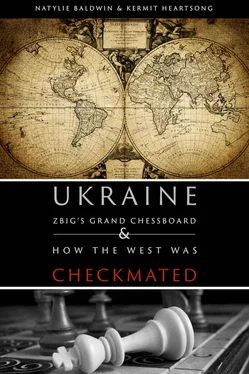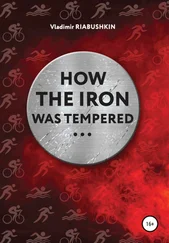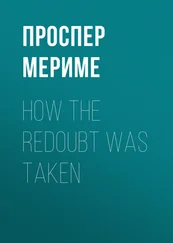Kermit Heartsong - Ukraine - ZBIG's Grand Chess Board & How The West Was Checkmated
Здесь есть возможность читать онлайн «Kermit Heartsong - Ukraine - ZBIG's Grand Chess Board & How The West Was Checkmated» весь текст электронной книги совершенно бесплатно (целиком полную версию без сокращений). В некоторых случаях можно слушать аудио, скачать через торрент в формате fb2 и присутствует краткое содержание. Год выпуска: 2015, Жанр: Политика, на английском языке. Описание произведения, (предисловие) а так же отзывы посетителей доступны на портале библиотеки ЛибКат.
- Название:Ukraine: ZBIG's Grand Chess Board & How The West Was Checkmated
- Автор:
- Жанр:
- Год:2015
- ISBN:нет данных
- Рейтинг книги:4 / 5. Голосов: 1
-
Избранное:Добавить в избранное
- Отзывы:
-
Ваша оценка:
- 80
- 1
- 2
- 3
- 4
- 5
Ukraine: ZBIG's Grand Chess Board & How The West Was Checkmated: краткое содержание, описание и аннотация
Предлагаем к чтению аннотацию, описание, краткое содержание или предисловие (зависит от того, что написал сам автор книги «Ukraine: ZBIG's Grand Chess Board & How The West Was Checkmated»). Если вы не нашли необходимую информацию о книге — напишите в комментариях, мы постараемся отыскать её.
Ukraine: ZBIG's Grand Chess Board & How The West Was Checkmated — читать онлайн бесплатно полную книгу (весь текст) целиком
Ниже представлен текст книги, разбитый по страницам. Система сохранения места последней прочитанной страницы, позволяет с удобством читать онлайн бесплатно книгу «Ukraine: ZBIG's Grand Chess Board & How The West Was Checkmated», без необходимости каждый раз заново искать на чём Вы остановились. Поставьте закладку, и сможете в любой момент перейти на страницу, на которой закончили чтение.
Интервал:
Закладка:
— Sergei Lavrov, September 27, 2014 United Nations Speech
While breaking down the West’s argument regarding Russia’s illegal annexation of Crimea, it is important to establish a baseline definition of annexation and then to follow the trail of events:
Annexation — the formal act of acquiring something (especially territory) by conquest or occupation; “the French annexation of Madagascar as a colony in 1896”; “a protectorate has frequently been a first step to annexation.” (Webster Online)
As mentioned earlier, on March 11, 2014, the Crimean Parliament voted for a declaration of independence as a first step in formally separating from the Ukrainian state. The referendum (Quebec, Scotland, etc.), a democratic vote by the people to determine their future, was then undertaken on March 16, 2014, which garnered a super majority of the votes, 96 percent for re-unification with Russia.
For those who have stated that the referendum was illegal, as it violated the Ukrainian constitution (despite its clear legality under international law per the Kosovo advisory opinion), it is important to establish, if, indeed, there was a viable and functioning Ukrainian constitution in place.
One of the major arguments put forth for the legality of the Crimean vote is that the violent overthrow, coup d'état , of President Yanukovych was itself illegal, as the constitutional process for impeachment was never followed. Thus the coup that had illegally removed the legally elected President, Yanukovych, from office, invalidated the Ukrainian constitution. The referendum, therefore, could not have violated an instrument that had been rendered null and void by a violent coup d'état .
Other arguments presented against the validity of the Crimean referendum are:
Russian troops intimidated voters, so the process was not free and fair.
Ewald Stadler, a member of the European Parliament, dismissed the myth of a referendum at gunpoint when he stated, “I haven’t seen anything even resembling pressure. People themselves want to have their say” (RT 2014).
Russia bussed in larger numbers of native Russians to stack the deck.
Like the Western allegations of serial Russian invasions and the shoot down of Malaysian Flight MH17 that are completely free of an evidentiary trail to back Western charges, there is not a single shred of evidence, even in terms of social media, to back these allegations.
The referendum was inconsistent with the Ukrainian constitution, which says that all Ukrainians would have to vote on Crimea’s secession.
As mentioned above, the violent coup, which removed from office the legally elected President of Ukraine, Yanukovych, rendered the constitution a dead letter.
The Russian proposal was based on an outdated theory of secession.
In terms of the law — the United Nations International Court of Justice handed down an advisory opinion in 2010 saying unambiguously that a unilateral declaration of independence is in accordance with international law (Mezyaev 2014).
Additionally, the conditions and legitimacy of the Crimean referendum was overseen by 135 international observers from 23 countries (Austria, Belgium, Bulgaria, France, Germany, Hungary, Italy, Latvia, Poland, etc.). Among those monitoring the referendum were members of the EU and national European parliaments, international law experts and human rights activists (RT 2014).
It’s a matter of international law: territory cannot be annexed simply because the people who happen to be living there today want to secede.
By virtue of the principle of equal rights and self-determination of peoples enshrined in the Charter of the United Nations, all peoples have the right to freely determine, without external interference, their political status and to pursue their economic, social, and cultural development, and every State has the duty to respect this right in accordance with the provisions of the Charter (Declaration on Principles of International Law 1970).
And finally, as discussed by Alexander Mezyaev (2014), a Russian lawyer and chief of the Department of the Constitutional and International Law of the Public Management University of Tatarstan:
It should be noted that no way could Russia’s actions be compared with what the West does — Russia acts upon the invitation of the Ukraine’s legal authority. Here is the mismatch between the international law and what Western politicians say and do. They realize well that the authority which has invited Russia is legal. That’s why the discussion is adroitly made [to] slide to the issue of “legitimacy” which is not a legal, but rather a scientific notion.(Mezyaev 2014)
Mr. Mezyaev (2014) then goes on to hypothesize, given the above, what Western lawyers truly mean by the pronouncements of “violation of international law”:
So what do Western governments and their lawyers mean when they say the Crimea referendum is “in violation of international law”? The lack of clear-cut definitions and weighty legal arguments is egregious. It proves that they understand well the referendum in Crimea does not violate any whatsoever international legal norms. To the contrary, it’s an example of compliance with international law by the people of Crimea. (Mezyaev 2014)
Over the course of the referendum the various international observers believed the referendum credible and free of violations. One of the lead international observers, Mateus Psikorkski, reported that, “Our observers have not registered any violations of voting rules.” And international observer, Pavel Chemev, stated:
The lines are very long, the turnout is big indeed. Organization and procedures are 100 percent in line with the European standards.
With regard to the right of the Crimeans to hold a referendum, a number of the observers had the following to say:
Our opinion is — if people want to decide their future, they should have the right to do that and the international community should respect that. There is a goal of people in Crimea to vote about their own future. Of course, Kiev is not happy about that, but still they have to accept and to respect the vote of people in Crimea.
— Johann Gudenus, member of the City Parliament of Vienna,
The view we get from the American and European media is very distorted. You get no objective information. So we decided to come here to have a look at what’s really going on and see if this referendum is credible.
— Johannes Hübner, an Austrian MP
Yes, I think the referendum is legitimate. We are talking about long-term history. We are talking about the Russian people, about the territories of the former USSR with artificial borders. So, I think it’s a legitimate referendum that will give opportunity for this Russian population’s reunification with Russia.
— Aymeric Chauprade, a political scientist and geopolitician from France
At the end of the day, the Crimeans had decided their own fate through a legal referendum overseen by 135 international observers; yet the hypocritical cries from the West of an “illegal Crimean annexation” flowed readily.
Despite an overwhelming response by the Crimean peoples to distance themselves from the illegal junta in Kiev stacked with oligarchs and neo-Nazis, the West, at the behest of the United States, decided to levy sanctions against the Russians. Perhaps future historians will wonder who indeed was responsible for the geopolitical actions of the West.
To compare for a moment Kosovo versus the Crimea, it is important to take note of the differences.
The Russians, for instance, did not rain bombs on an entire population for eleven weeks. The Russians did not unleash cluster bombs on densely crowded marketplaces or target civilian passenger trains and petrochemical plants or use depleted uranium munitions. The Russians did not recklessly kill the exact people that they were supposed to have been protecting. The Russians did not fire a single round of ammunition, did not kill a single person, and did not drop a single bomb. No one died. The Russians simply waited for Crimeans to conduct and conclude their referendum, for which over 90 % voted in favor. Russia then welcomed Crimea into the Russian Federation.
Читать дальшеИнтервал:
Закладка:
Похожие книги на «Ukraine: ZBIG's Grand Chess Board & How The West Was Checkmated»
Представляем Вашему вниманию похожие книги на «Ukraine: ZBIG's Grand Chess Board & How The West Was Checkmated» списком для выбора. Мы отобрали схожую по названию и смыслу литературу в надежде предоставить читателям больше вариантов отыскать новые, интересные, ещё непрочитанные произведения.
Обсуждение, отзывы о книге «Ukraine: ZBIG's Grand Chess Board & How The West Was Checkmated» и просто собственные мнения читателей. Оставьте ваши комментарии, напишите, что Вы думаете о произведении, его смысле или главных героях. Укажите что конкретно понравилось, а что нет, и почему Вы так считаете.











